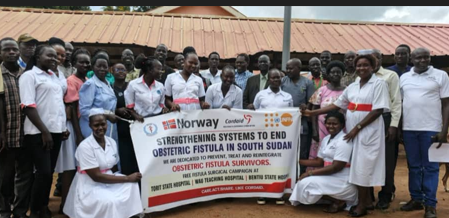Cordaid, in collaboration with the Eastern Equatoria State health ministry, with funding from UNFPA and the Norwegian Embassy in Juba, on Monday launched a free obstetric fistula surgical campaign in Torit Town for patients from across the state.
Obstetric fistula is primarily caused by prolonged, obstructed labor where the baby’s head repeatedly presses on the mother’s pelvis, cutting off blood supply to tissues, causing them to die and creating a hole between the birth canal and the bladder or rectum, leading to uncontrolled leakage of urine and faeces.
According to the national health ministry, approximately 60,000 women and girls are suffering from obstetric fistula. Contributing factors include lack of access to skilled birth attendants and emergency obstetric care, poverty, malnutrition, adolescent pregnancy, and other social factors like early marriage.
Bure Juma Wani, the area representative for Cordaid in Torit, said the surgeons are already on the ground and patients will be identified and transported from across the state to be treated at Torit State Hospital.
“I would like to welcome all of you to this occasion. This is a campaign of fistula that is going to take place in Torit today, and through the support of UNFPA,” he said. “I am happy today that we are opening this program officially, that is a surgical operation for patients in Eastern Equatoria State as a whole, and about 26 patients are already in the ward, and about 3 are on the way to join the rest.”
For his part, Otim Simon, a representative of the South Sudan Nurses and Midwives Association (SSNAMA), expresses the association’s commitment to support fistula survivors who are often neglected and face stigma.
“We are also going to be responsible for the integration of these patients, and we have some things to help the patients start their lives in the community,” he said. “Our fistula patients are traumatized and neglected by their communities, so we are going to help them start a new life.”
Meanwhile, Clementina Lubaya, the state’s director of reproductive health, lauded UNFPA for its support and urged fistula patients to embrace the campaign.
“I would like to register my thanks to UNFPA and for the support from Norway for this surgical repair, which is going to happen. We have a weak referral system in Eastern Equatoria,” she said. “Family planning is very important to prevent unintended pregnancy, and skilled birth and delivery must always be the emergency operation care for those who develop complications.”
“We need to create a lot of awareness in the community, so if you know that you have a fistula, my sisters and mothers who are around, please report yourself,” Lubaya added.
On his part, Konyen Moses, the state’s inspector of gender, child, and social welfare, proposed the establishment of a permanent fistula department in the state.
“The people with fistula are not different from those suffering from gender-based violence because they face the same stigma,” he stated. “This launch alone is not enough, and we want a department of fistula to be established at Torit Hospital because after this campaign, the doctors will go back.”
Dr. Koma Akim, UNFPA Clinical Coordinator for Obstetric Fistula in Juba, said about 184 fistula patients have successfully undergone surgery in Wau, Bentiu, and Torit, with the number expected to increase.
“We have treated 184 women and girls suffering from obstetric fistula, and most of them have received reintegration packages,” he stated. “Here at Torit Hospital today, we received 24 obstetric fistula survivors, and so far, 5 of them have been scheduled for surgeries this (Monday) morning, and the rest will receive their surgery during the week.”
“Let us continue to work together with determination and compassion to ensure that no woman or girl in South Sudan suffers from Obstetric Fistula,” Dr. Akim appealed.
Several of the patients whose names were withheld said they are often divorced by their husbands, and they expressed happiness at finally finding treatment.
“When I suffered a fistula, I requested my husband to take me to the hospital, but he refused, saying I brought the sickness from outside and that I should go alone,” one of the patients narrated.
Another victim said she has been suffering from a fistula since 2014, and her husband married another wife and divorced her.
A man who escorted his wife to the surgery said he stood by her side because the sickness was not her making.
“My wife is now sick, but it was not her making,” he said. “I have always been with her in this critical moment, and I promise to be close to her without isolating her like others who abandoned their wives.”




